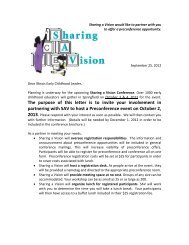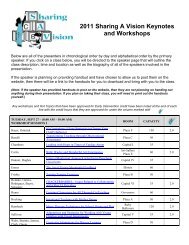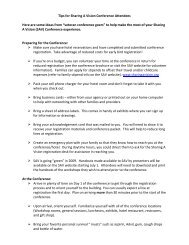FUNCTIONAL ASSESSMENT INTERVIEW FORM—YOUNG CHILD
functional assessment interview form—young child - Center on the ...
functional assessment interview form—young child - Center on the ...
- No tags were found...
You also want an ePaper? Increase the reach of your titles
YUMPU automatically turns print PDFs into web optimized ePapers that Google loves.
Module 3aHandout 3a.6: Individualized Intensive InterventionsD. DESCRIBE THE <strong>CHILD</strong>'S PLAY ABILITIES AND DIFFICULTIES1. Describe how your child plays (With what? How often?).Solitary play in dress-up and sometimes at computer. Parallel play at blocks, water table, and science area. Athome, plays alone with trucks, planes, trains, puzzles, books, and computer.2. Does your child have challenging behavior when playing? Describe.Computer and dress-up, usually plays nicely, but during outside play and blocks (cars, trucks, magnetic bendablepeople, legos, blocks, bright builders...) he will get aggressive if he sees something he wants, if he wants to joinother's play, if a child takes his toy or a piece of his toy, or he perceives a child is going to take his toy.When playing with neighborhood friends, the same occurs.3. Does your child play alone? What does he/she do?Yes, he prefers it.4. Does your child play with adults? What toys or games?Yes, school reports that he craves one-on-one adult attention. At home he wants to play with mom with everything.With dad, he will play rough and he is tolerant of the roughness.5. Does your child play with other children his/her age? What toys or games?Yes, one boy in particular at school and the boy will give in to Tim and try to “fix” situations when he becomesaggressive with others by telling the kids to give him the toy or by giving Tim a duplicate toy. Occasionally, he willplay with neighborhood friends (one boy and one girl his age), but he needs to be closely monitored because theywill be aggressive with one another. Plays with trucks, cars, trains, and planes.6. How does your child react if you join in a play activity with him/her?He's fine at both school and home as long as you do not change or alter what he is doing.7. How does your child react if you stop playing with him/her?He's fine at both school and home.8. How does your child react if you ask him/her to stop playing with a toy and switch to a different toy?At school he does not like it. He would want to negotiate more time, give reasons why, and tell you he is notfinished. At home he does not transition well; says “no” or “just a minute.”Rev. 2/10The Center on the Social and Emotional Foundations for Early Learning Vanderbilt University vanderbilt.edu/csefelH 3a6(P. 4/8)





